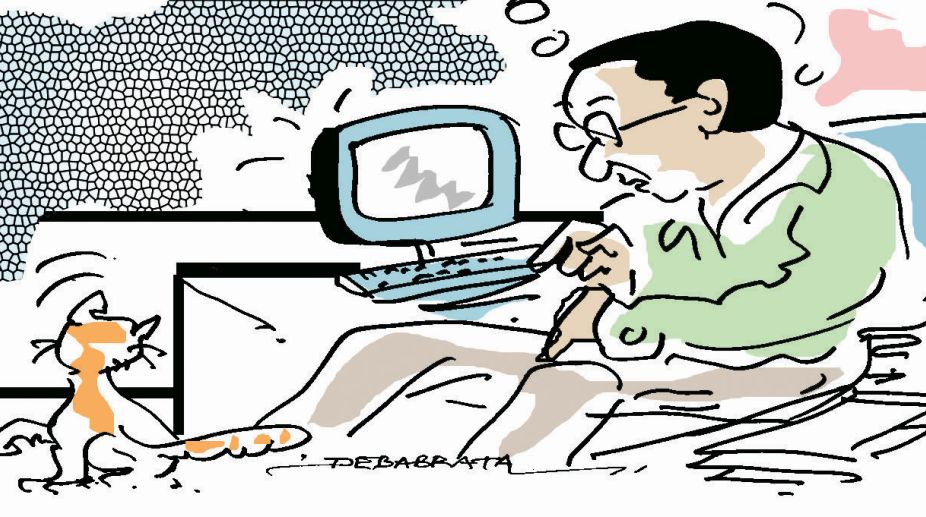Apple showcases iPhone 15’s durability in an auto rickshaw in India
The new Apple campaign will air on broadcast and will also appear on digital pre-roll, TVO and social media.

Robot
I love my laptop. Apple makes the Mac a smooth, elegant, good-looking object. It is easy to love. That love has grown over the years, as all my writings have accumulated there. All the information I can’t live without – the people I know, the banks I use, the utilities that supply gas and electricity – are all there. Every letter I write and every account I settle is recorded there. Everywhere I go it goes with me, wrapped lovingly in a padded case that has seen Europe, Middle East, Asia and Latin America.
When my daughter took a cruise, she left her cat, Sancho, with me. Sancho stayed close to me as I read a book on the terrace, weaved between my legs as I climbed the stairs and, at the end of a fortnight, left me for its mistress. It left behind, I realized, an ineffable sense of loss, a companion who had created a link unknown to me. My Russian neighbor’s dog, Kirby, inexplicably formed an attachment for me, walked and ran with me for five years. When she had to be put to sleep, I missed that beautiful husky, and frankly grieved her absence for months.
These attachments, for a thing or for a pet, are no doubt different from our attachment to people. Kamal, a dear friend of many years, who lived in another country but remained close to my heart, suddenly passed away last year, barely a week before we were to meet. The wound is yet to heal. I dread the prospect of losing other friends and relatives, who have meant so much to me.
Advertisement
It astounds me now to find that this hierarchy that we have fixed in our mind –people, pets and things – is beginning to blur. We are beginning to see the invasion of ‘creatures’ that have the characteristics of all three and form emotional bonds that become a major part of our lives. The word robot has a hard, metallic ring that belies the warm, fuzzy feeling it can and does often generate in our lives.
Some of my friends no longer write a query for Google to answer; they turn on the microphone and speak to it. What intrigues me is that their tone increasingly suggests they are talking with a friend. Imagine a robot, forever standing or sitting next to you, in the house, office or car, ready to answer every question, recall every name or telephone number, help you to every destination. You may gingerly accept the possibility of a close personal link with the entity; yet perhaps you have no idea how close we are already to the prospect.
You will find it harder to take the next step and realize that the ever-knowing, ever-ready robotic Jeeves will, just like Wodehouse’s creation, soon become a special friend, perhaps closer to you than all your flesh-and-blood friends. Probably closer than the temperamental, controlling, somewhat self-centred boyfriend or girlfriend you have preferred over lonely weekends. Even closer – dare I say it? – than the spouse you have had for twenty years, who has evolved into a lukewarm, quasi-pleasant, semi-distant companion.
If you think this is wild speculation, you probably don’t know about the robots now available and the wide research in emotional bonds between people and their robo-friends. Japan, the most advanced country in robotics, is investing heavily in robots to help the elderly, for whom not enough helpers are available in its shrinking population. Large corporations like Sony and Honda are turning out increasingly sophisticated robots that not only help people to walk, eat, dress, clean and move, but also act as companions and confidants. These robo-friends – for whom we still don’t have a decent friendly name, such as ‘palbot’ – don’t just answer questions, like Siri on your iPhone, but also listen to you and give polite replies, respond with empathy when you are upset, express enthusiasm when you describe an achievement and, when you touch them, say coquettishly, “Ooh, I like it when you touch me!”
Slightly, but not entirely, different are the robo-friends hundreds of companies are installing in stores, pharmacies, utilities and information desks, which not just guide clients but have the additional responsibility to foster a positive reaction, leading to better sales and repeat patronage. These robots are designed to be very beautiful and extremely courteous. Designers are now building a spectrum of variations, so that they can be appropriately charming, provocative or subtly erotic depending on the content and tone of the client’s approach. Reportedly, sex toy manufacturers are exploring highly advanced sexbots that will provide the partners not just varied, high-quality sex but also seductive titillation in advance and refined, post-coital conversation afterward. Men and women, who have had enough of flighty dates and rejections, will turn to escort services for attractive partners who are also fully pliable and predictable.
I have no doubt that this utopia will be an immense draw for people who prefer an orderly emotional life at all costs. Yet one has to wonder: What kind of people would prefer relating to an entity, despite a captivating exterior, that is essentially a cleverly programmed enchanting machine? What would make you leave the unpredictable charms and risks of a truly human relationship and seek the sure comfort of a robo-lover?
Advertisement